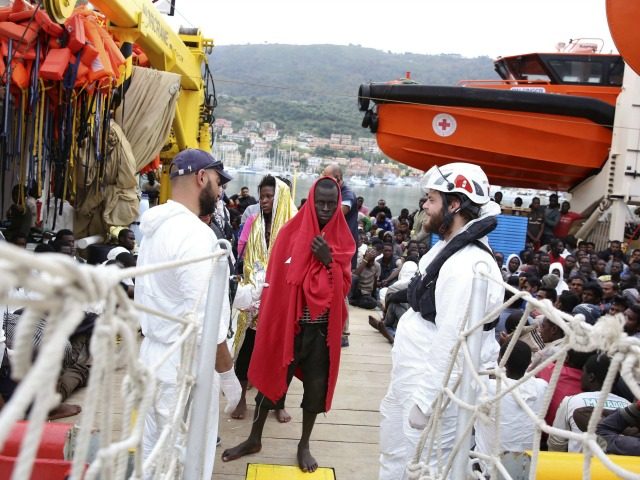The European Union’s (EU) border agency Frontex has accused major charities of colluding with criminal gangs to bring migrants into Europe.
Frontex put its concerns about charities working in the Mediterranean in a confidential report written last month, and seen by the Financial Times. The document said migrants had been given “clear indications before departure on the precise direction to be followed in order to reach the NGOs’ boats.”
Frontex was more explicit in its concern over non-governmental organisations (NGOs) working in the Mediterranean in another report last week, which stated: “First reported case where the criminal networks were smuggling migrants directly on an NGO vessel.”
The border agency also said migrants rescued by charities’ boats often refused to cooperate with debriefing experts, with some claiming “that they were warned [by NGOs] not to co-operate with Italian law enforcement or Frontex”.
Frontex figures show the number of rescues triggered by a distress signal fell from around two-thirds of all incidents in the summer to barely even one in 10 in October.
This shift coincided with a massive increase in NGO activity in the central Mediterranean, with so-called charities accounting for 40 per cent of rescues in October compared with just five per cent at the start of this year.
In their reports, Frontex suggested that one reason for the change in activity could be that NGOs have been operating much closer to Libyan territorial waters. Charities working in the Mediterranean have denied the accusations.
Médecins Sans Frontières (Doctors Without Borders – MSF), the Financial Times’ “Seasonal Charity” for 2016, told the newspaper: “We are actively searching for boats in distress. We spot them earlier. This is a response to the needs that we see at sea. If that proves collusion, I do not think so.”
MSF “humanitarian adviser” Aurelie Ponthieu slammed the EU for even looking into the issue, saying: “It is not about whether there is collusion between NGOs and smugglers: the issue is why so many people die, which is what Frontex should be focusing on.
“They should be looking at their own actions,” she added.
The pro-mass migration Daily Beast spoke to a rescue worker with one of the charities operating in the Mediterranean, who admitted that most aid agencies actually have contacts on the ground in North Africa who tell them when vessels are sent out to sea.
“That’s hardly colluding”, the source said of the act, adding: “What it does is give us a heads-up so we can try to save people.”
For their “Seasonal Appeal” this year, the Financial Times highlighted MSF’s “psychological first aid” for migrants as a good cause to which they think readers should donate. An article entitled “FT Seasonal Appeal: MSF gives ‘psychological first aid’ to migrants” details the work of the group’s “mental health programme for refugees” in Italy.
In September, the head of Austria’s anti-human trafficking force warned that much of the profit of people smugglers in the Middle East and North Africa goes to Islamic State, and is now the terror group’s primary source of funding.

COMMENTS
Please let us know if you're having issues with commenting.